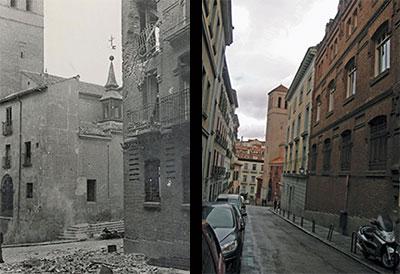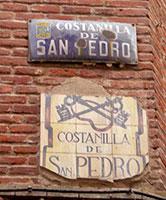Peering into the past
Haunted by the ghost of her grandfather, who vanished over 70 years ago, Professor Marimar Huguet-Jerez is on a quest to solve a personal history mystery.


It was a bright February morning in Fuente el Saz, a tiny Spanish town just outside Madrid, and Marimar Huguet-Jerez was searching for Calle de la Plaza 3. She’d already found both locations of the local hardware store her grandfather had worked for (now a bar and a Japanese restaurant), but she hoped that visiting his childhood home might provide some yet-undiscovered clue in the mystery she’d been trying to solve for nearly a year now—the mystery of her grandfather’s identity and disappearance.
She spotted an old man and, aware that small-town elders can be as useful as census records, asked him about the address. “That doesn’t exist,” he said. “But only because they changed its name to Martina García Street. Who are you looking for, anyway?”
“Oh, a relative,” Huguet-Jerez said, offering up the name but little else.
“Oh, yes, of course,” the man said. “I grew up with his sons.”
Jackpot.
Reconstructing the Past
First, a quick review, just in case you were sleeping on the Quad that day of world history class. From 1936–39, a bloody civil war raged in Spain between the newly established Frente Popular Republican government (made up of various left-wing political organizations) and the conservative Nationalists, who favored a more militaristic, fascist system and received support from Adolf Hitler and Benito Mussilini. An estimated half-million lives were lost before the Nationalists proved victorious, transforming Spain’s government into a dictatorship led by General Francisco Franco.

Born and raised in 1970s-Madrid, Huguet-Jerez, now an assistant professor of Spanish at The College of New Jersey, always wondered how such a brutal chapter of her country’s history could have faded from national consciousness so quickly. “The Spanish Civil War is a topic that has always called my attention,” she says. “It was always very strange to me that a terrible war had taken place in a country that, on the surface, seemed so far away and unaware of it…. If you ask an average Spanish citizen about the war, many would have no clue what it was about [or] why it happened.” This post-war amnesia was so widespread that there’s even a term for it: pacto de olvido (“pact of forgetting”). “The fear of awakening the violence and horrors of the Civil War and the resulting dictatorship made people on both sides of the political spectrum want to simply forget the past and, with time, ignore the shameful atrocities committed on the innocent victims of the war,” Huguet-Jerez says, “but you cannot simply forget the past; you have to confront the ghosts of the past.”
In her case, that meant confronting a family ghost: that of her grandfather, who disappeared during the war, possibly one of the thousands of civilians killed in the carnage. The little she knew about him—he was named Arturo Martín and worked as a doctor in Madrid—was based only on family rumors. Those rumors could be neither confirmed nor denied by Marimar’s grandmother, who had never married him and passed away in 1955; nor by her mother, who was born around the time he died.
“If you asked my mother who her father was, she had no idea,” says Huguet-Jerez, the youngest of four children. “Looking at my sons, I sometimes thought, ‘These children exist because of a man who no one knows, a person who is blank in everyone’s mind.’ I’ve been the only person in my family who’s ever shown an interest in my grandfather’s story, but [not knowing] always bothered me, so I decided I was going to do something about it.”
Armed with only wisps of information —and uncertain how true any of them were—she took a yearlong sabbatical from the classroom and set out to uncover her grandfather’s identity and the story behind his disappearance. In the process, she visited medical archives, historical archives, medical schools, and prisons; spent countless hours reading and researching; and fully immersed herself in the history of the war itself, all for the purpose of this markedly personal history lesson.
Obstacles, breakthroughs, and finding the context

Huguet-Jerez describes the literature of the civil war period as “very rich,” and considering she earned a Master’s and PhD in Spanish literature, she would know. Indeed, well-known writers including Ernest Hemingway and George Orwell wrote about and supported the Republican cause, resulting in classics like For Whom the Bell Tolls and Homage to Catalonia. As part of her research process, and to help place her grandfather’s story in context, Huguet-Jerez read numerous books from and about the war, and even wrote her own short stories about it. To dive still further into the time of her grandfather’s disappearance, she interviewed several survivors from the war, many of whom now live in Alcorcón, Spain, her hometown. (She plans to publish those interviews in some form—possibly as short stories, possibly as a project for the Alcorcón City Hall.)
The survivors shared gripping accounts of their own wartime experiences, stories of parents executed and neighbors captured, but when it came to her grandfather’s tale, Huguet-Jerez had only the basics: his name, Arturo Martín. It may sound like helpful information to have, but Spaniards have two last names—the first from their father, the second from their mother—and even more confounding, finding a Martín in Spain is like finding a Smith or a Jones in the United States.
Google searches and archival records became her trusted research assistants, and last summer, at the beginning of her sabbatical year, Huguet-Jerez had a breakthrough while on a trip to Spain. Knowing that her grandmother, Modesta, had become pregnant during the war and left Madrid for Alicante, Huguet-Jerez contacted an archive that stored data about an old Alicante facility for single mothers. There, she uncovered a document that listed Arturo Martín and Modesta Marín as the parents of her mother, María Luisa Martín Marín. “That was my first useful clue,” she remembers. “My mother, María Luisa Jerez Marín, had never seen her name written anywhere as María Luisa Martín Marín. I felt just like a detective.”
While it didn’t include her grandfather’s second last name, the paper did mention that a copy of María Luisa’s birth certificate was on file with the city’s civil registry. Detective Huguet-Jerez tracked it down this past February, and finally had the first piece to her family puzzle: Arturo Martín Lopez. Her grandfather’s full name.
The birth certificate also listed Arturo’s age, hometown, parents, and profession. (It turned out he was a hardware store clerk, not a doctor, as the family rumor had said.) From there, Huguet-Jerez logged on to the digital archives of a conservative Spanish newspaper and found an obituary that stated her grandfather and a handful of other hardware store employees had been assassinated by the “red herds” in October of 1936. (Her mother was born eight months later in June 1937.) “I still don’t know why they were killed,” she says. “I imagine that maybe it was a bomb, but the only bombings in Madrid were by the [Nationalist] Fascists. If that’s true, the paper was false and trying to blame the Republicans for his death.” (She’s found a few old photos of the street that seem to further this bombing theory.)
Hoping Arturo’s death certificate might offer more specifics, she requested a copy, which arrived in mid-February. That document said that he was “assassinated by the Marxist herds.” Though the statement appeared to reinforce the newspaper article, it’s likely one may have informed the other, and so the big question mark left in Huguet-Jerez’ quest is her grandfather’s political affiliation—something she may never be able to confirm. Still, the certificate contained something equally search-altering: mention of a wife and two children Arturo had left behind—none of whom were Huguet-Jerez’ mother or grandmother.
Translating the past into the present

So where does she go next? Already, Huguet-Jerez has begun to translate her grandfather’s life story into a book—a historical novel set during the war. “I think real history comes from the people,” she says. “If it gets published, it would be one more ingredient, adding his personal story to the larger history. Sometimes, you can learn more from listening to someone’s story than you could from a textbook.”
And thanks to her conversation in February with the elderly man from Fuente el Saz, Huguet-Jerez has confirmed the existence of some long-lost relatives: her grandfather’s two sons mentioned in the death certificate, both of whom are in their 80s now. “I don’t know how willing they’re going to be to meet some family all of a sudden,” she says. “I’m very realistic about it. I wish that they want to meet us, but I have to also accept that maybe they don’t want to deal with it.” Still, she’ll give it a try when she returns to Spain this summer.
She also plans to continue sharing her grandfather’s story with her students—something she’s always done in the civil war–era literature classes she teaches. “The minute you mingle a personal story with the history the students are learning about, it makes the class so much more interesting and real,” she says. Thanks to her year of research, the story she’ll be able to share this fall “will be more complete and documented now; and hopefully I will have the last piece of the puzzle with me by then.”
While she’d secretly hoped to discover that her grandfather was a heroic Republican freedom-fighter, Huguet-Jerez realizes that she may never know his political affiliation or the reason he was killed. “Even if I never find out what truly happened to him, or even if I find out that he was involved with a political side I was not expecting him to be on, the truth of the matter is that his death added to the unfortunate list of ill-fated people who lost their lives in a war that should have never started,” she says. “And that is what saddens me the most.”
Posted on May 27, 2010

